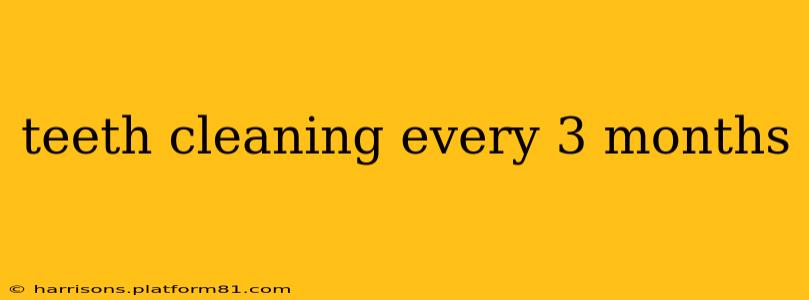Maintaining optimal oral health is crucial for overall well-being. While the recommended frequency of professional teeth cleanings is often debated, understanding your individual needs is key. This comprehensive guide explores the benefits of regular dental cleanings, delves into the "every 3 months" question, and helps you determine the best cleaning schedule for your specific circumstances.
How Often Should I Get My Teeth Cleaned?
The standard recommendation from dentists is to schedule professional teeth cleanings and checkups at least twice a year, or every six months. This recommendation is based on the average person's risk factors for developing gum disease and cavities. However, several factors can influence how often you should visit your dentist.
What are the benefits of professional teeth cleanings?
Professional cleanings offer several advantages beyond what you can achieve at home:
- Plaque and Tartar Removal: Dentists and hygienists utilize specialized tools to remove plaque and tartar (hardened plaque) that are difficult to eliminate with brushing and flossing alone. These deposits contribute significantly to gum disease and tooth decay.
- Gum Disease Prevention: Regular cleanings help detect and treat gingivitis (early gum disease) before it progresses to periodontitis, a more severe form that can lead to tooth loss.
- Early Detection of Oral Cancer: During your cleaning, your dentist can visually examine your mouth for any signs of oral cancer, enabling early diagnosis and treatment.
- Stain Removal: Professional cleanings can effectively remove surface stains from coffee, tea, tobacco, and other sources, leaving your teeth brighter and whiter.
- Personalized Oral Hygiene Advice: Your dentist can offer tailored advice on improving your brushing and flossing techniques, ensuring you’re maximizing your at-home oral hygiene efforts.
Should I get my teeth cleaned every 3 months?
While some individuals may benefit from more frequent cleanings, getting your teeth cleaned every three months is generally not necessary for individuals with healthy gums and good oral hygiene habits. More frequent cleanings might be recommended if:
- You have a history of gum disease: More frequent monitoring and cleanings can help prevent recurrence.
- You smoke or use tobacco products: Smoking increases the risk of gum disease and stains.
- You have diabetes: Diabetes can increase susceptibility to gum disease.
- You are undergoing orthodontic treatment: Braces make it more challenging to maintain optimal oral hygiene.
- You have a compromised immune system: A weakened immune system increases the risk of infections.
- Your dentist recommends it: Your dentist's professional judgment is paramount, and they may suggest more frequent cleanings based on a thorough assessment of your oral health.
What if I have sensitive teeth?
If you have sensitive teeth, talk to your dentist. They can recommend specific techniques and tools to minimize discomfort during cleaning. Sometimes, a different type of cleaning or a desensitizing treatment might be necessary.
How can I improve my oral hygiene at home?
Maintaining excellent oral hygiene at home is crucial, regardless of your cleaning frequency. This includes:
- Brushing twice daily: Use a fluoride toothpaste and brush for at least two minutes each time, paying attention to the gum line.
- Flossing daily: Flossing removes plaque and food particles from between teeth where your toothbrush can't reach.
- Using an antimicrobial mouthwash: This can help kill bacteria and reduce plaque buildup.
- Maintaining a healthy diet: Limit sugary and acidic foods and drinks.
Is it bad to go longer than six months between cleanings?
Yes, going longer than six months between professional cleanings significantly increases your risk of developing gum disease and cavities. While good home care is essential, professional cleanings are crucial for removing plaque and tartar buildup that you cannot remove yourself.
Conclusion
While the standard recommendation for professional cleanings is every six months, individual needs vary. Consult your dentist to determine the optimal frequency for your specific circumstances. Maintaining excellent at-home oral hygiene and attending regular dental checkups are fundamental to preserving your oral health and overall well-being. Remember, your dentist is your best resource for personalized advice on maintaining a healthy smile.
